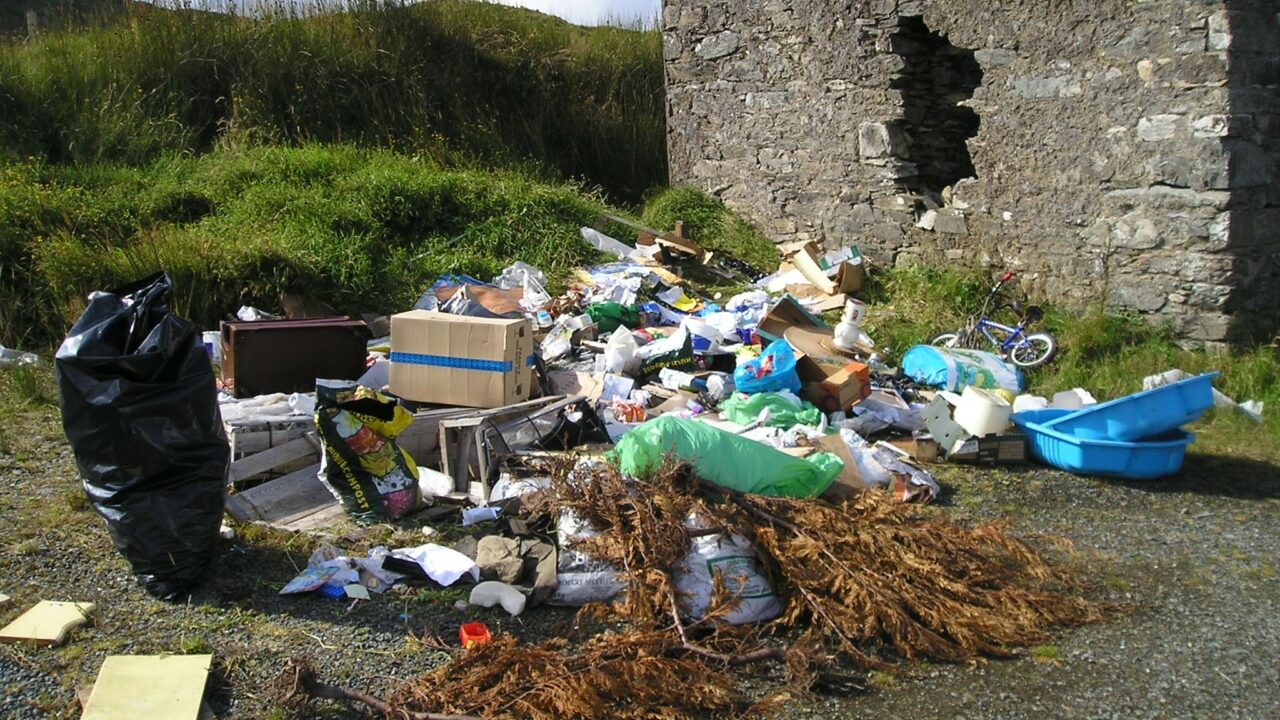Waste management has become an increasingly important issue in farming throughout Ireland.
Everyday issues encountered by farmers include the disposal of waste generated from routine practices to dealing with consequences from the unauthorised activities of others and the increasing blight of illegal dumping.
It is important for everyone to understand their responsibilities in respect of correct waste management practices in order to protect the environment, and to protect themselves from potential prosecution.
Tyre producer responsibility initiative
The Waste Management Tyre Regulations apply to all farmers once the first movement of waste tyres onto or from their farm occurs; after which, farmers using waste tyres to anchor a silage pit must register with the approved body – Circol ELT, formerly known as Repak ELT. Click here for more information
Once registered, farmers are entitled to store up to a maximum of eight tyres/m² of their silage pit’s floor area. Farmers are prohibited from storing other waste tyres on their farm, other than the temporary storage of tyres related to their business.
Registered farmers must inform Circol ELT (Repak ELT) of all tyre movements onto or off their farm. All waste tyres removed off the farm must be done in an authorised manner.
Farm plastics
Ireland is one of the few countries in Europe to have introduced legislation specifically designed to promote farm plastics recycling. The regulations are critical to supporting farm plastics recycling as they place a legal responsibility on producers of farm film products to specifically support recycling.
The regulations require companies that sell farm film products to either become directly involved in the recycling of farm plastics waste with their customers (referred to as offering a deposit and refund scheme) or to participate in a Government-approved farm plastics recycling scheme.
The Irish Farm Film Producers Group (IFFPG) is the national farm plastics recycling compliance scheme. It provides a recycling service for farmers to ensure we reach recycling targets set by Government.
It operates approximately 235 bring centres annually, as well as providing a farmyard collection service.
The IFFPG currently recycles in excess of 25,000t of farm plastics yearly, which equates to a national recycling rate of over 70%. The dates and locations for 2018 are available on the IFFPG website or simply click here
Hazardous waste disposal
The Farm Hazardous Waste Collection scheme was established to provide farmers with an accessible location in which they can safely dispose of hazardous waste.
The scheme is led by the EPA in collaboration with Teagasc, the Department of Agriculture, the DCCAE and local authorities. While some waste can be disposed of free of charge, other types range in price from €2-4/kg.
For more information on collection dates and locations can be found by clicking here
Containers
Empty pesticide and dairy hygiene containers are potentially hazardous wastes if not managed properly and can represent a management challenge for farmers.
To assist farmers in managing this waste, national agencies have issued guidelines on how to manage these empty containers. Only triple-rinsed empty pesticide containers can be classified as non-hazardous waste.
The guidelines are available from the EPA.
Backyard burning
Burning waste is not only a nuisance to neighbours; it can release many harmful chemicals into the atmosphere. Such illegal practices leads to the release of toxic dioxins which are a real hazard for peoples’ health and the environment.
In September 2009, a law concerning waste disposal by burning came into force. These regulations, the Waste Management (Prohibition of Waste Disposal by Burning) Regulations make explicit the offence of the disposal of waste by uncontrolled burning and prohibits such disposal within the curtilage of a dwelling.
Failure to comply with these regulations is an offence and fines of up to €3,000 may be imposed.
Penalties
Penalties under the Waste Management Act, as amended, shall be liable to:
- On summary conviction, to a Class A fine (€5,000) or to imprisonment for a term not exceeding 12 months, or to both such fine and such imprisonment; or
- On conviction on indictment, to a fine not exceeding €15 million or to imprisonment for a term not exceeding 10 years, or to both such fine and such imprisonment.
Cross Compliance
Under Cross Compliance requirements, a farmer receiving payment must respect the various Statutory Management Requirements and GAEC standards set down in EU legislation (Directives and Regulations) on the environment, climate change, good agricultural condition of land, public, animal and plant health and animal welfare.
Complaints
The EPA operates a confidential national environmental complaints line to enable members of the public to report environmental pollution, fly-tipping, and illegal dumping of waste.
Local authorities and/or the Gardai and the EPA will follow up on the information provided by the public.




